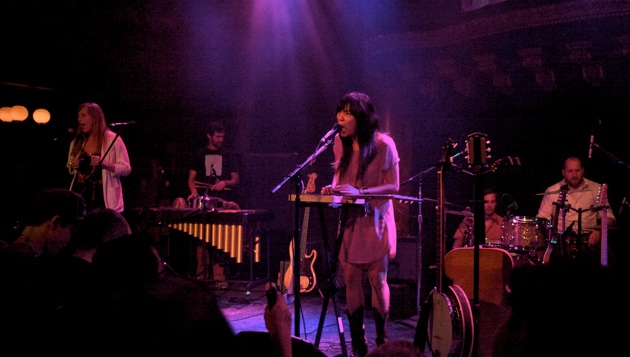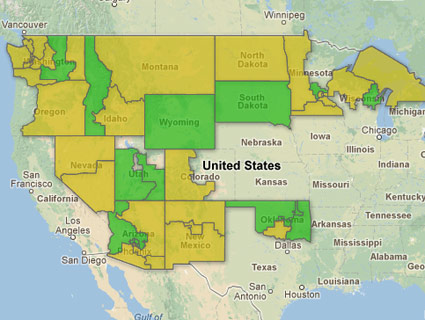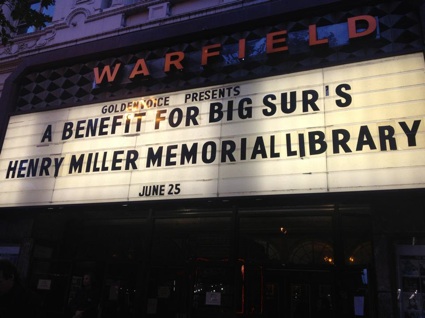
Thao Nguyen at Noise Pop 2013.Sydney Brownstone
It was 2008, and amid the wreckage of the financial meltdown, indie folk was having a moment. Bon Iver’s “authentic” melancholy dominated a generation of breakup playlists. Fleet Foxes’ swelling, choir-boy harmonies packed the pews. And a little-known songwriter named Thao Nguyen was picking up Cat Power comparisons with her album We Brave Bee Stings and All.
Reviewers praised Thao as quirky (she learned how to play guitar in her mother’s laundromat) and perky (the record was stuffed with beat-boxing and handclaps), if not raw—at times her voice swung stubbornly off-key, which lent her an air of rough-hewn realness. The lyrics, too, cut deft and deep: Thao would sing in one moment about dewy childhood nostalgia, and in another dive into a dark corporeality of blood, bones, and heart attacks. She was 23 years old.
Fast-forward through five years of relentless touring and collaboration (with Radiolab, Mirah, and tUnE-YarDs’ Merrill Garbus, among others), and Thao is backstage at San Francisco’s Great American Music Hall preparing for her sold-out Noise Pop set. Sipping tea, she shows me an iPhone app that mimics a Tibetan singing bowl, a tool she uses to keep herself grounded. “It’s an insight timer,” she explains, one hand hovering over the device as it tosses rings of sound around the room. “It gives you five seconds to set up, and then at the end gives you three to stop.”
In the past year and a half that she has spent living in San Francisco—a rare and necessary break from her spiritual exhaustion on the road—Thao has undergone some serious artistic growth. Digging her cowboy boots into Bay Area soil, she started making amends with herself and her family, and jumped into advocacy work for women prisoners. “I didn’t want to proceed as I had been, which was more a spectator of life in general, and mine in particular,” she told me. On tour, she explains, she had reached a point where she felt detached and numb—as though she’d been living inside a block of ice.
You can hear the thaw on We The Common, the new album Thao and her band the Get Down Stay Down put out last month. It’s more focused than Bee Stings and offers more wisdom than the heartbroken bitterness on the band’s 2009 album, Know Better, Learn Faster. From the sly banjo and full-throated chorus that open up the title track—a song dedicated to one of the prisoners Nguyen met through California Coalition for Women Prisoners (CCWP)—to the noodling electric-guitar grit on “City,” a rally cry inspired by Occupy Oakland, one gets the sense that Thao is reorienting herself as a part of something bigger. Her music feels larger than before, pulsing with tom-tom rumbles and horn skronks, yet she sings with a tenderness that throws a new, more sophisticated shape onto her work.
Now Thao is touring again, but without the fear that it will wear her down. “I’ve spent most of my 20s on tour and I’ve made a bunch of terrible decisions,” she told me. “Before, I didn’t have the maturity to understand that this is my job, this is what I do, and it can be healthy.” I spoke with Thao about working with prisoners, bouncing back from numbness, and looking for “the end of want.”
Mother Jones: What drew you to start helping women locked up in prison?
Thao Nguyen: I didn’t know exactly, until I started, but then it became very clear very quickly. It was actually after the last Noise Pop show that I went on a CCWP visit. They asked me to fill in because they were short-staffed. The causes that I support and align with most are women’s issues, and a lot of those tend to deal with domestic violence, women’s health, and women’s empowerment in general. And that comes from when I was a kid growing up, just a lot of the things I witnessed, the things I saw my mom endure—it was a sort of, turbulent setting, and I’ve always held that very close. A lot of the women that we see are in jail or prison for defending themselves from their abusers. A lot of the women are accessories to something; they’re not actually perpetrators. What truly drew me is I see my mom in these women in a lot of ways. Due to circumstances and resources and lack thereof, they are in prison, sentenced 25 years to life. Many of the people we see are sentenced to life without parole. It’s really wild to be in that space and know that you will leave and they will stay.
MJ: How does your mom feel about your advocacy?
TN: It’s funny. We haven’t talked directly about why I’m into this stuff. She’s supportive, but she’s worried that I get too involved. She doesn’t want me to go to protests and stuff. She really doesn’t want me to get arrested. She really doesn’t want me bringing drugs…not that I do drugs! She’s just really worried, because of the system. This all-powerful institution, she doesn’t want me to be in opposition to it.
MJ: You dedicated one of your songs to a prisoner, Valerie Bolden. What was your connection with her?
TN: What connected me to Valerie at first was her sense of humor, and that it was so easily and so quickly a conversation between friends. She was maybe the second or third person I saw on my first visit. But we just sat down and started talking, and she said, “What’s your ethnicity?” And I said, “I’m Vietnamese.” And I asked her if she wanted to learn something in Vietnamese. My favorite thing to teach people—my mom would be horrified—means “It’s so cold your penis shrivels.” And that was it. We were just friends. But if she talked about her kids at all, you could just see she just lives for them. She hadn’t seen them for 12 years. They live in the LA area, and she’s in Chowchilla. She’s been in jail for 14 years. So it was witnessing somebody’s—just such a stark sadness. To have access to that in another person is a privilege in a way. [Pauses.] I’d never experienced anything like that. Seeing that kind of sadness.
MJ: That kind of knowledge seems like a big responsibility.
TN: Yeah, I think this whole experience with CCWP is once you see and know, you can’t go on as though you haven’t. And to know that it’s happening in this parallel universe—there are thousands of women, just in California, and they consider themselves almost a forgotten people; society has very little interest in their welfare because they’ve committed a crime. But what are the reasons for the crime, and what keeps one person in and one person out? Obviously there are people who are violent, who are a threat to society. But so many of these women are nonviolent offenders, and also they’ve been in prison for 17 to 20 years, and I can’t believe that they would still be a threat to anybody.

MJ: How has your involvement with the Occupy movement influenced your songwriting and your thinking?
TN: There’s a song called “City” that was written as a tribute to really amazing activist friends that I have, and that was happening at the beginning of Occupy. And we were on tour at the time so I could check out these burgeoning hubs of activity, and we came home and I thought, “If I lay still through this, shame if I sleep tonight.” And that was very much the feeling at the time—up until that point I hadn’t felt like that kind of energy. At the time it felt like a tangible beginning, and who knows where it led or how it led. And I felt obligated, I felt it was my responsibility to be a part of that.
MJ: You took some time off from touring. Were there things you were trying to resolve?
TN: I didn’t want to proceed as I had been, which was more a spectator of life in general, mine in particular, and not really tending to relationships as I should, not really valuing people in my life. Valuing them, but not really taking the time—it was an issue of extending myself, and of acknowledging people—and wanting a home and wanting to go see my mom. She doesn’t care anymore, but for years and years she checked in on me every day but we don’t talk. It was very gruff. And I’m [whines and throws a fake tantrum] like a fucking toddler. And there was no connection. And that’s all she wanted from me, just some of me. I was choosing to be alone when I didn’t want to be. So those are the things I’d be restless over.
MJ: How do you nurture your creativity?
TN: It’s really a painful process. I wish I could come up with a better way. I have truly active periods because I’m on deadline because somebody’s paying for something, and people are angry with me…but what happens when I’m not making something, or I’m on tour or whatever, it’s this disdain, this self-disgust that inches and inches and crawls and then it just consumes me and I’m fucking terrible to be around and then I realize it’s because I really love making things, but I have this…I don’t know why we don’t do the things we love. We feel like we don’t deserve it or something. In short, I don’t really have discipline. I reach a point where I’m so disgusted with feeling disgusted. There’s got to be a better way.
MJ: I definitely get that. So, I noticed that a theme of cold running through your latest album. On “Age of Ice,” you sing, “It takes a fine imagination and a sound technology to let loose cold amnesia over all the blood that beats.” The lyrics on “We Don’t Call” also struck me: “Do we live too long, do you wait too much, when you hold too hard, turns us cold to touch.” Tell me about this coldness.
TN: It’s a willing, voluntary disconnect. I always thought I needed that distance to stay protected. And that cold amnesia is forgetting everything that’s important to you so you can go on in the way you feel you need to go on, but in truth you don’t need that. And the records are so…there’s an undercurrent of revival throughout, and breaking free of that numbness. That cold to me is being numb and existing within a block of ice. And the feeling times, that song about coming alive and breathing. I guess there were just parts of me that were more dead than others.
MJ: The short film you codirected as a preview for this album was pretty funny. In it, you read a bad online review for the new record, and then you actually go to the critic’s home to confront him and see if he’ll change his mind. Once you ring the doorbell, you realize the reviewer hasn’t even hit puberty. Does self-doubt creep up sometimes, and if so, what do you do to shut it down in real life?
TN: Oh, yeah. I think it will come up, and it’s an issue of how will you meet it? That sketch in particular was really important to me to be doing around the time of the release. I have gotten [weird reviews] before. I try not to read anything because I know how sensitive I am and how debilitating it is and how it follows me around. If they’re bad, you feel terrible, you feel worthless, no matter if you think they’re wrong—and if they’re good, it feels cheap and sleazy because you went looking for it. Nothing will ever be good enough until you decide that what you do is fine and you fucking get on with it. It helps to think “I’m not going to stop.” How realistic would that be if someone panned a record and I just quit my job? Quit trying to make a living. Sometimes I’ve threatened to quit music when I’m feeling ungrateful, and then I think, “Well, what the hell would I do?” I’m really not punctual, I feel like I’d be fired on the first day. I’ve always wanted to be a writer, a short-story writer. But talk about making a living!
MJ: Do you feel any trepidation about picking up and touring again?
TN: I think I have less than I ever have before. And it returns to being connected and understanding what things are. I’ve always had this vision that the touring lifestyle is so unsustainable. But I have faith that I can do it now, and I don’t become a victim of my job or my work. And I can remove my self-worth from what I make and how many people show up.
MJ: “I’ve been looking for the end of want,” is a line that stuck with me on “Holy Roller.” What does the end of want look like to you?
TN: The end of want looks like gratitude. I still am trying. But it’s really easy to not be satisfied with your work, or people, or anything, but I really embrace the idea of not having to want. Not because you’re denying yourself anything, but because it’s already there.
Click here for more music coverage from Mother Jones.

















